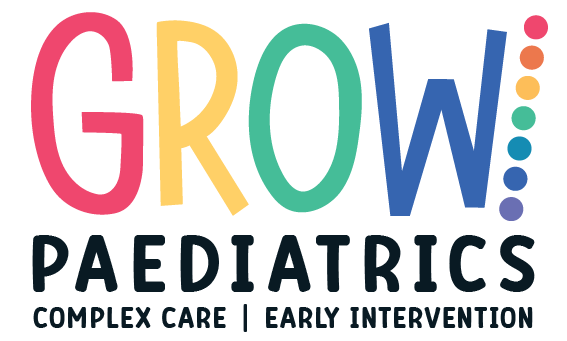Our Services
-

Speech
-

Sleep
-

Toileting
-

Feeding
-

Medications
Speech Pathology
At GROW Paediatrics, our speech pathology services are tailored to support the unique communication needs of children aged 0-8 years. We focus on fostering language development, enhancing communication skills, play, feeding and AAC (alternative and augmentative communication).
Our speech pathologists work closely with families to create individualised intervention approaches that are both effective and engaging, utilising evidence-based practice to support children meet their goals. Our speech pathology team is here to support their development in a nurturing and supportive environment, empowering them to communicate confidently and effectively.
Sleep
We understand that sleep is essential for your child’s well-being and development. Our dedicated team, including an occupational therapist with extensive post-graduate training and a paediatric nurse with specialised expertise, is here to help. We offer comprehensive sleep assessments and develop individualised plans tailored to your child's unique needs. Whether your child struggles with falling asleep, staying asleep, or establishing a healthy sleep routine, we provide the support and guidance your family needs to achieve restful nights and brighter days
Complex Toileting
Toileting can be a complex process, particularly for children with additional needs. Our dedicated team of specialists are here to provide comprehensive support tailored to your child's unique needs. We begin with a thorough assessment to understand the specific continence challenges your child may be facing. This includes evaluating physical, sensory, and behavioural factors that might be influencing their toileting abilities.
Based on this assessment, we create individualised toileting plans that are designed to meet your child's needs and fit seamlessly into their daily routines. Our plans focus on building independence, boosting confidence, and ensuring that your child feels comfortable and supported throughout the process. We also work closely with families to provide education and strategies that can be implemented at home, ensuring consistency and success.
At GROW Paediatrics, we are committed to helping your child achieve continence in a way that promotes dignity, self-esteem, and a sense of accomplishment. Whether your child is just beginning toilet training or facing ongoing challenges, GROW can support this process.
Feeding Therapy
We understand that feeding can be a complex and challenging journey for many families. Our dedicated team of specialists offers comprehensive support for a wide range of feeding difficulties, including Avoidant/Restrictive Food Intake Disorder (ARFID), craniofacial abnormalities, intravenous feeding needs, tube weaning, breast and bottle feeding challenges, transitioning to solids, and picky eating behaviours. We provide individualised, evidence-based interventions tailored to each child's unique needs, focusing on creating positive and enjoyable feeding experiences. Through compassionate care and collaborative strategies, we empower families and help children develop healthy, nourishing relationships with food that support their growth and well-being.
Occupational Therapy
Our skilled occupational therapists play a vital role in supporting your child's development. We focus on helping children achieve independence in their daily activities, enhancing their fine motor skills, sensory processing, and overall functional abilities. Whether your child needs support with self-care tasks like dressing and toileting, improving handwriting, or developing play and social skills, our occupational therapists provide personalised interventions tailored to their unique needs. We work closely with families to ensure that each child reaches their full potential in a nurturing and supportive environment.
Complex Care Registered Nurse
Our Complex Care Registered Nurse plays a vital role in supporting children with complex medical needs. With specialised training and extensive experience, our nurse provides comprehensive care that addresses both medical and developmental challenges. From managing enteral feeding, tube weaning, and medication support, to coordinating with our multidisciplinary team, our Complex Care Registered Nurse ensures that each child's unique needs are met with compassion and expertise. By working closely with families, our nurse helps to create and implement individualised care plans that promote health, well-being, and overall development in a supportive and nurturing environment.
Specialist Educator
At GROW Paediatrics, our specialist educators are dedicated to supporting your child's development through a comprehensive, play-based approach. Holding early childhood degrees, our educators possess a deep understanding of all aspects of childhood development. They focus on fostering essential skills through play, ensuring that learning is both engaging and effective. By building warm, meaningful relationships with both children and their families, our educators create a nurturing environment where children feel safe to explore, learn, and grow. Whether it's enhancing cognitive abilities, language skills, or social-emotional development, our team is committed to helping your child thrive.
Allied Health Assistant Program
Empowering Progress Through Collaborative Care
At GROW Paediatrics, our Allied Health Assistant (AHA) Program is designed to complement and enhance your child’s therapeutic journey. Working under the guidance of our experienced therapists, AHAs provide tailored support to help your child achieve their developmental goals. This collaborative approach ensures continuity of care and maximizes the benefits of therapy.
How Can Our AHA Program Support Your Child?
Reinforce Therapy Goals
- AHAs work directly with your child to practice and strengthen skills introduced during therapy sessions.
- Examples include developing fine motor skills, improving communication techniques, or building confidence in daily routines.
Consistency and Continuity
- With regular sessions, AHAs provide consistent reinforcement of strategies, ensuring progress is sustained between therapy appointments.
Skill Development in Everyday Environments
- AHAs focus on applying therapeutic goals in real-life settings, such as home, school, or the community.
- This practical support helps your child generalize their skills and builds independence.
Increased Access to Therapy
AHAs provide cost-effective support, allowing for additional sessions to extend your child’s therapy program.
What Does an AHA Session Look Like?
Every session is carefully planned in collaboration with your child’s therapist. AHAs deliver engaging, goal-oriented activities in a fun and supportive environment. Sessions may include:
- Practicing communication skills with interactive games.
- Encouraging sensory exploration to support emotional regulation.
- Assisting with self-help tasks like dressing, toileting, or mealtime routines.
Why Choose GROW’s AHA Program?
At GROW Paediatrics, our AHAs are highly trained and supervised by our skilled therapy team. This ensures that every session aligns with your child’s therapeutic goals and supports their overall progress. We are committed to providing holistic, family-centered care that empowers both children and their families.
Is the AHA Program Right for My Child?
Our AHA Program is ideal for children who:
- Need extra practice to build on therapy goals.
- Benefit from consistent support to develop skills.
- Thrive with structured, hands-on activities in their natural environments.
Get Started Today!
To learn more about how our Allied Health Assistant Program can support your child’s therapy journey, contact us at hello@growpaediatrics.au Let’s work together to help your child thrive!
Support Work
Empowering Families, Enhancing Independence
At GROW Paediatrics, our Support Work Program is dedicated to providing personalised, practical assistance to children and their families. Our trained support workers help children navigate daily challenges, build independence, and participate fully in their home, school, and community environments.
How Does Support Work Help Your Child?
Practical Assistance in Daily Routines
- Support workers assist children with activities like dressing, toileting, mealtime routines, and hygiene.
- This practical help fosters independence and builds confidence in everyday tasks.
Social and Community Participation
- Our support workers encourage and facilitate participation in community activities, school events, or social outings.
- This focus on inclusion helps children build friendships and develop critical social skills.
Reinforcement of Therapy Goals
- Support workers collaborate closely with therapists to ensure that therapy strategies are integrated into daily life.
- Examples include practicing communication skills during outings or applying self-regulation techniques during challenging moments.
Family Support and Relief
- By providing hands-on assistance, our support workers give families the time and space to recharge, knowing their child is in caring and capable hands.
What Does a Support Work Session Look Like?
Each session is tailored to the child’s needs and goals. Activities may include:
- Helping a child practice toileting routines to build independence.
- Supporting participation in extracurricular activities, such as sports or art classes.
- Assisting with transitions, such as moving from home to school or vice versa.
- Guiding social interactions during playdates or community outings.
Why Choose GROW’s Support Work Program?
At GROW Paediatrics, our support workers are trained to provide compassionate, child-centered care. Every plan is developed in collaboration with families and therapists to ensure a consistent, holistic approach that aligns with the child’s goals.
Who Can Benefit from Support Work?
Support work is ideal for children who:
- Need assistance with daily routines or self-care tasks.
- Require support to participate in social or community activities.
- Benefit from additional practice to apply therapeutic strategies in real-life settings.
Get Started Today!
Ready to explore how our Support Work Program can support your child and family? Contact us at hello@growpaediatrics.au or book a consultation to discuss your needs. Together, we’ll create a plan to support your child’s growth, independence, and success!
IV Feeding Support and Education
We are committed to supporting the health and well-being of children who require IV feeding, ensuring they can participate fully and safely in their educational journey. We can help with:
- Customised IV Feeding Plans: We develop individualised IV feeding plans that cater to each child’s specific nutritional needs and medical requirements. These plans are designed in collaboration with healthcare professionals, families, and educational staff to ensure seamless integration into the child’s daily routine.
- Education and Training for Educators: We provide specialized training for educators and support staff to help them understand the essentials of IV feeding, including safe handling, monitoring, and emergency procedures. This training empowers educational settings to confidently support children with IV feeding needs.
- Ongoing Support and Consultation: Our team is available for ongoing consultation to address any concerns or challenges that may arise, ensuring that each child’s IV feeding is managed effectively and safely.
Key Worker
In the early intervention space, the key worker model is widely recognized as best practice for delivering effective, coordinated care. This approach designates a primary professional who takes the lead in managing and coordinating the child's care and intervention services.
By focusing on the following principles, the key worker model ensures that children receive coordinated, high-quality care tailored to their individual needs, promoting better developmental outcomes and supporting families through the early intervention process.
Here’s how it works:
Key Worker Model: A Best Practice Approach
Central Point of Contact
The key worker serves as the main point of contact for the child and their family. They help to simplify the process by providing consistent communication and support, ensuring that families have a clear understanding of the intervention plan and how to navigate the services available.
Holistic Coordination
The key worker coordinates with other specialists—such as speech pathologists, occupational therapists, and physiotherapists—to create a unified intervention strategy. This coordination ensures that all aspects of the child's needs are addressed in a comprehensive manner, avoiding duplication and enhancing the effectiveness of the intervention.
Individualised Care Plans
The key worker develops and implements personalised care plans tailored to each child's unique needs. By working closely with families, they ensure that the interventions are relevant and adapted to the child's developmental stage, strengths, and challenges.
Family-Centred Approach
This model emphasises the importance of family involvement in the intervention process. The key worker supports and empowers families by providing them with the tools, resources, and guidance they need to actively participate in their child’s development and progress.
Continuity and Consistency
The key worker provides continuity of care, which helps build a strong, trusting relationship with the child and their family. This consistent relationship fosters a more effective intervention process and supports better outcomes for the child.
Best Practice Evidence
Research and evidence in the field of early intervention consistently highlight the effectiveness of the key worker model. It is associated with improved outcomes in child development, greater family satisfaction, and more efficient use of resources.
Workshops & PDs
Our diverse range of workshops are designed to be interactive, informative, and practical, equipping participants with the tools they need to make a meaningful impact on the lives of the children they support. Whether you’re a parent, educator, or health professional, GROW Paediatrics is here to provide the guidance and expertise you need.
Mentoring
With Jessie Anderson - Director
Jessie is a highly experienced speech pathologist in paediatric feeding and is thrilled to extend her expertise through mentoring opportunities for fellow speech pathologists.
Whether it's one-on-one guidance or small group sessions, she'll provide a supportive environment for professionals looking to enhance their skills in this area.
Mentoring sessions are tailored to individual needs, fostering a dynamic exchange of knowledge and practical insights. Sessions can be offered through zoom or face to face.
-

1:1 Telehealth Appointments
Request Services -

Professional Development & Workshops
Book Now -

1:1 Consult - Albury, VIC
Request Services



